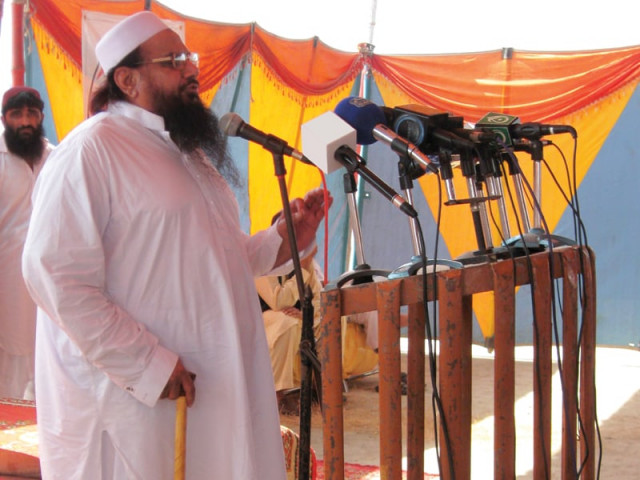JuD includes religious lessons with flood relief
Jamaatud Dawa doesn’t proselytise, discriminate or recruit at relief camps, says leader.

JuD includes religious lessons with flood relief
The two thousand people sheltering in tents are grateful to the young men who rescued them as the waters came. Now they live at the relief camps and are fed twice a day - a daily dose of food peppered liberally with religious teachings.
The camps in focus were set up by the Falah-e-Insaniat Foundation (FeF) — the philanthropy wing of the Jamaatud Dawa.
“They come and remind us again and again to pray namaz,” said Mazhar*, who fled Malkani and ended up at the Badin flood camp.
“Namaz parho, Quran parho, safai karo!” exclaimed one of the women, mimicking a female instructor at the camp. Say your prayers, read the Quran and keep clean.
“We are not forced to pray though,” Mazhar hastens to add. But there is plenty of encouragement. Families have been given prayer mats and copies of the Quran.
‘Educating’ the displaced
At the Golarchi relief camp, coordinator Mohammad Ashraf spoke at length about the classes in Islamic syllabus that are being imparted to the 60 families who reside there, 18 of them belonging to the Hindu faith.
“The biggest problem here,” he said, “is the lack of education.”
When asked to elaborate, Ashraf let forth. “There were old, bearded Muslim men who did not know how to recite the Kalima!”
“Now, Masha Allah, there is no one who does not. We have taught them the namaz, as well as the required prayers to recite before and after a meal.”
“Even the Hindus sit in the session because we tell them about cleanliness and also, it is consistent in all faiths to say God’s name before starting a meal.”
He evaded the question of whether camp residents are mandated to attend these sessions on religious education, which are held after Maghrib prayers for men and during the day for children.
However, JuD chief Hafiz Saeed told The Express Tribune, “We do not forcibly make children go to jihad or pray namaz. This is propaganda against us. You can go in and ask anyone at the camp. Firstly, you cannot ‘force’ anyone, and even if we did, no one would then come to our camps.”
‘Equal opportunities for all’
For a religious organisation which spends its time railing against the US and India, Saeed and other FeF members were quick to emphasise its ‘equal’ approach in rehabilitating flood victims of all faiths.
Saeed, who addressed hundreds of flood victims at Badin, said that the FeF had not differentiated because this was a tragedy and showed how ‘united’ the country was in this crisis.
Even though the Badin relief camp residents said there were no Hindu families at the camp – “This is a Muslim camp, the Hindus are across the road” - in Golarchi, there were 18 families and one woman insisted she had been treated well.
FeF workers also said they did not know why there had been discrimination in providing relief goods to Hindu flood victims. “In one case,” JuD’s public relations officer Nadeem said, “We had Hindu traders who would give us food and supplies directly because they trusted our distribution system.”
But, at the same time, Ashraf highlighted the case of Karhio Ghanhwar, a city where over 200 Hindu families had not been provided any aid by the government.
Even though the spotlight has been firmly trained on the JuD since its alleged role in the 26/11 attacks in Mumbai, Saeed believes that the organisation’s exoneration from the courts has helped improve its standing in Pakistan. However, the organisation’s role in relief work - including in the 2005 earthquake, 2008 IDPs crisis and the floods in 2010 - have prompted scrutiny, particularly from the foreign press. But does radicalisation happen when disaster strikes and FeF steps into action, or is it a long-term process?
Analyst Mosharraf Zaidi says it is the latter. “The thing that needs to be examined is radical organisations providing services that the government provides. So a non-state actor becomes a viable alternative to the state. There is a lot of chest-thumping and handwringing over this, but can the state writ be maintained when non-state actors have greater credibility than the state?”
(Read: Militant charities versus US aid)
*Names have been changed to protect the privacy of individuals
Correction: An earlier version of this story incorrectly stated that the Jamaatud Dawa is a banned outfit.
Published in The Express Tribune, October 26th, 2011.



















COMMENTS
Comments are moderated and generally will be posted if they are on-topic and not abusive.
For more information, please see our Comments FAQ